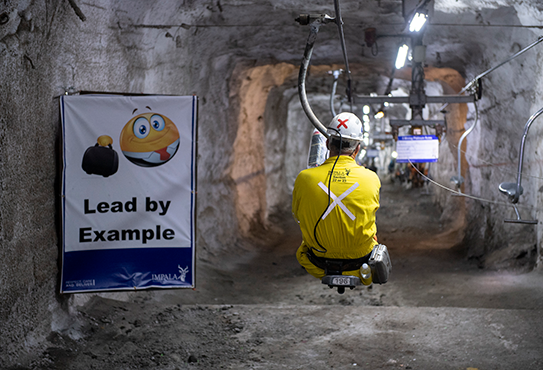Creating a better future through strategic partnerships for responsible water stewardship
By Dr Tsakani Mthombeni, Executive: Sustainable Development, Implats
With the correct frameworks and management, public-private partnerships (PPPs) are being deployed to assist in solving some of South Africa’s more intractable electricity and rail logistics constraints to boost the country’s economic performance.
Less discussed in the public sphere, however, is the role of PPPs in water provision. Access to water is a basic human right. It is vital to health, dignity and opportunity. But in southern Africa, it is by no means guaranteed. Large and growing populations mean that demand is substantial and steadily increasing. At the same time, climate change is increasing the severity of droughts and floods across the region, and deteriorating public infrastructure has meant that supply is often inadequate, even when rainfall is abundant.
South Africa’s National Water and Sanitation Master Plan noted that in 2017 over three million South Africans lacked access to a basic water supply service, and 14.1 million people lacked access to safe sanitation. More than 50% of South Africa’s wetlands have been lost, and of those that remain, 33% are in poor ecological condition. As a result, the plan projects a 17% water deficit by 2030 if no additional action is taken. Water scarcity is a growing crisis that cannot be ignored.
The role of the private sector
Over the past decades there has been increasing pressure on listed and multinational companies to properly understand their environmental and social impact, to commit to sustainable operational and business practices, and to develop innovative models and initiatives in this regard.
Listed companies are aligned with global reporting requirements and frameworks such as the United Nations Sustainable Development Goals, Task Force on Climate-Related Financial Disclosures, CDP disclosures and global ISO standards. These frameworks require rigorous monitoring and analysis.
By using data to understand our impact and the impact of resource scarcity and climate change, we can better understand our vulnerabilities and risks, and implement pragmatic, results-driven models within appropriate timeframes, all within rigorous governance and reporting frameworks. This is a powerful foundation for positive social impact.
As a result, the private sector, and mining companies in particular, have been able to make an extraordinary contribution to socio-economic development in rural areas, including development related to ensuring efficient water reuse and adequate water supply.
Our operations have addressed supply constraints in vulnerable host communities through major infrastructure projects and continue to focus on alleviating water shortages. We work with municipalities and schools to improve water conservation and climate change awareness. We assist with strategic regional planning and local service provision, and work with local stakeholders to address immediate needs and ensure that bulk infrastructure is maintained and long-term planning is in place. At the same time, we work tirelessly to improve our internal water use – our goal is to achieve 70% water recycling and re-use by 2030, and have improved our performance to 52 % from 42 % over the past five years, earning an “A” rating from the CDP Water Disclosure Project.
Strategic partnerships are vital for long-term water security
We believe that the private sector can and must lead the way in demonstrating the art of the possible in terms of sustainable water use. The scale of the challenge, however, is too great for it to be solved by business alone. The answer to sustainable access to water, we believe, lies in strategic PPPs.
The private sector and parastatals can offer resources – principally expertise and funding – that governments are otherwise unable to obtain, and governments can help apply these resources at scale. These strategic partnerships address infrastructure problems that have financial, health, social or environmental consequences – and do so to the benefit of all stakeholders.
Alongside other commercial water users, Implats is part of two public/private partnerships – the Olifants Management Model and the Rustenburg Water Services Trust – which indicate the exciting potential of these models to support the development of effective, long-term water infrastructure.
The Rustenburg Water Services Trust
Rustenburg Municipality, a water-stressed area in South Africa, faced the dual challenge of increased water demand from domestic and industrial sources and deteriorating wastewater treatment capacity.
Public finances could not meet investment needs, which led to an engagement with local mining companies, including Implats. The municipality and mining companies established the Rustenburg Water Services Trust to finance and operate new water infrastructure. The Trust takes an innovative approach to blended finance. It secures ring-fenced revenues from municipal bulk-water sales and an off-take agreement with local mines. This revenue security enabled commercial finance to be accessed at favourable terms. The public sector played a key role in structuring a transaction that addressed critical water resource needs for the municipal area.
This strategic partnership has realised several benefits: secured supplies for mining, increased freshwater availability, and improvements in downstream water quality through better wastewater treatment. The partnership inspired a World Bank case study, which concluded: “The Rustenburg case proves that relatively small and financially weak municipalities can raise significant funding through well-structured projects with strong revenue streams from private sources,” and that “… there is high potential for replication in areas where industry has a stake in improving outcomes.”
The Olifants Management Model
Efforts to adequately address the water needs of the middle Olifants river catchment area in the Limpopo Province have been inadequate since they were initially conceptualised in the late 1990s. This has resulted in chronic water scarcity in the region and an associated increase in social unrest. Water infrastructure has been vandalised, and mining operations disrupted.
To address these pressing social and commercial challenges, government and a consortium of commercial water users, including our Marula mine, agreed to collaborate by entering a joint-venture arrangement to construct and manage bulk-water infrastructure.
This arrangement, termed the Olifants Management Model (OMM), was launched in 2022 and will accelerate the delivery of raw and potable water services in the region, creating employment opportunities and ensuring security of water supply for the Marula operation and its host communities.
The power of partnership
The crisis of water scarcity requires effective action today. Only through collaborative efforts and sustained commitment can we ensure access to this basic human right and secure a better future for generations to come.
The challenges underlying water scarcity in southern Africa – constrained public purses, struggling infrastructure, climate-related risk, and ever-increasing need – are familiar. PPPs represent a powerful tool to tackle these challenges, and where their success has been demonstrated they should be championed, embraced, and scaled.





